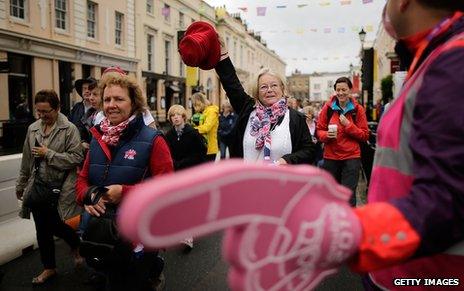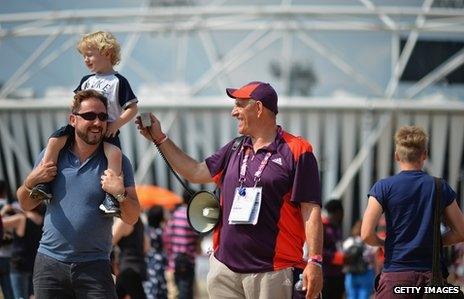How Britain rediscovered its forgotten confidence
- Published
- comments

The UK's national conversation is conducted in sceptical tones but for a few months we have talked in cheerful, optimistic voices. Have we changed our default position for good?
It was a "glorious summer".
Our stern alarums changed to merry meetings,
Our dreadful marches to delightful measures.
(Richard III, Shakespeare)
The tone of our national conversation changed - from its default position of self-criticism and negativity, Britain found itself speaking with a cheerful and optimistic voice.
There was a moment when it seemed the British press decided as one that the country wanted to be positive about the Games. Stories of lost coach drivers, missing security staff, chaotic public transport and diplomatic incidents over flags were no longer given space. The editor demanded uplifting tales of Olympian heroics and organisational triumph.
Instead of mounting barbed steeds
To fright the souls of fearful adversaries,
He capers nimbly in a lady's chamber
To the lascivious pleasing of a lute.
(Richard III)
It was an extraordinary shift.
We view our world through frames of understanding, the boundaries fixed by agreed narrative. Until mid-July, the story of London 2012 had been shaped by an accepted wisdom that the Games were hubristic extravagance at a time of austerity - not only a colossal waste of money but an event that would expose the shortcomings of a second-rate nation.
Something altered that frame, re-worked its carpentry to fit a different tale. Was it the sight of large crowds braving horizontal rain and sharp winds to cheer the torch relay on its journey to Stratford? Was it the absence of chaos on the capital's roads, Fleet Street's finest discovering that London still functioned (even if it had taken wads of cash handed to public transport staff)?
Or was it that the head of advertising reminded editorial just how much the paper had invested in its Olympic pull-outs and supplements? (Whoops! I am in danger of slipping into pre-summer cynicism.)
Whatever it was, with a ceremony conducted by a now complicit media, London 2012 was woven into the "civil religion" of the nation - afforded the same reverence as flag and anthem. Criticism became almost unpatriotic and those that continued to carp found their words lost on the winds of success and praise.

British summertime is always different from the mean time of the Westminster calendar. With the benches empty, the adversarial point-scoring of daily politics is absent too. That does change the tone of national argument and debate. But the summer of 2012 took the discussion into a different space.
It was as though our ancient country looked in the mirror and noticed something which belied the thin lips and wrinkled countenance staring back. There was kindliness and fun, self-confidence and competence in twinkling eyes, a look it had almost forgotten it ever had.
From the opening of the Olympics to the closing of the Paralympics, Britain banished all traces of a scowl and adopted a welcoming smile. It was not some Micawberesque optimism or ghastly forced grin, but a joyous recognition that our country is a whole lot better than we had allowed ourselves to say.
I think attitudes may have changed for good. This summer has reminded us of the values we know lie at the core of our national character: tolerance, charity and general goodwill.
At the weekend, as the Olympic stadium overflowed with fun and Paralympian admiration, I was watching another London stage where disability was portrayed as an explanation for evil ambition rather than a motivation for sporting triumph.

Mark Rylance's Richard III scuttled across the boards of the Globe Theatre, his withered arm symbolising a malevolent soul.
I, that am curtail'd of this fair proportion,
Cheated of feature by dissembling nature,
Deformed, unfinish'd, sent before my time
Into this breathing world, scarce half made up,
And that so lamely and unfashionable
That dogs bark at me as I halt by them;
(Richard III)
The play is a reminder of centuries of street prejudice against those with disabilities. Today, in the golden shadow of the Games, I wonder whether hostility or patronising pity has been replaced by respect and empathy.
The success of the Games Makers has perhaps changed attitudes towards voluntarism - a recognition that it is a vital part of public life, a platform for displaying the generosity of spirit and individuality that are central to British life.
The summer may also have made us more self-confident, reminding a country which will need to draw on its stores of resilience that it has much to be proud of: organisational ability; creative talent; the skills to nurture sporting excellence; a sense of humour.
Now are our brows bound with victorious wreaths.
(Richard III)